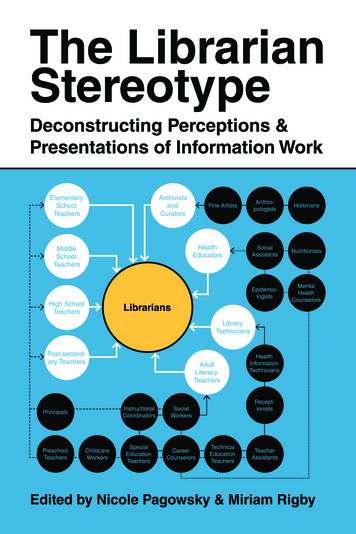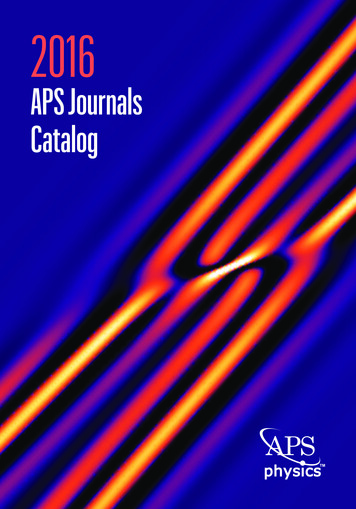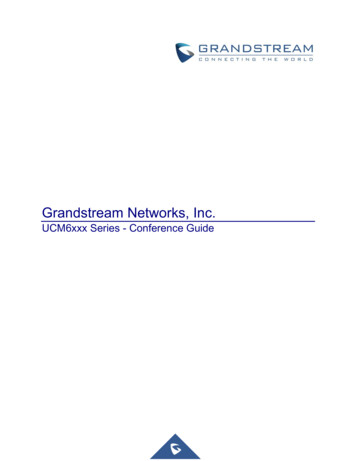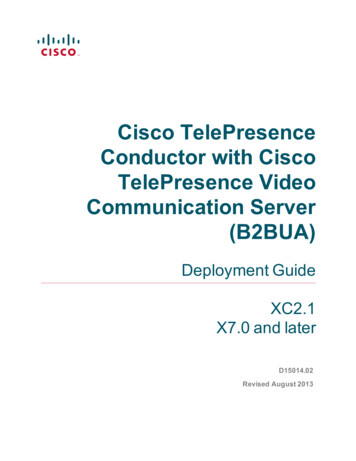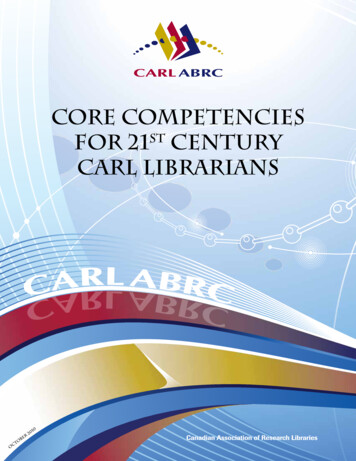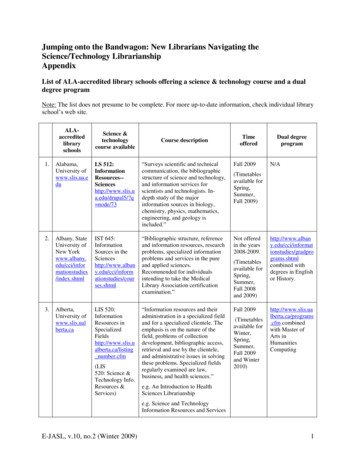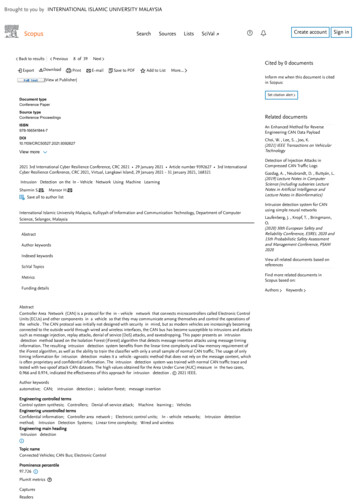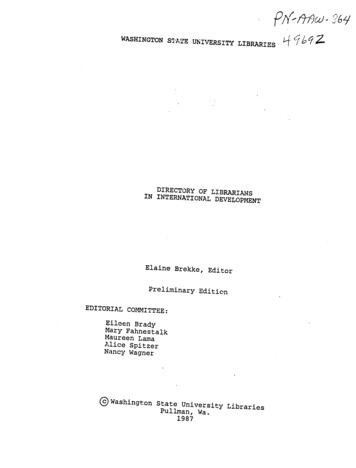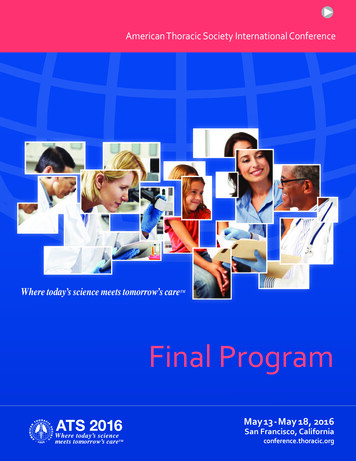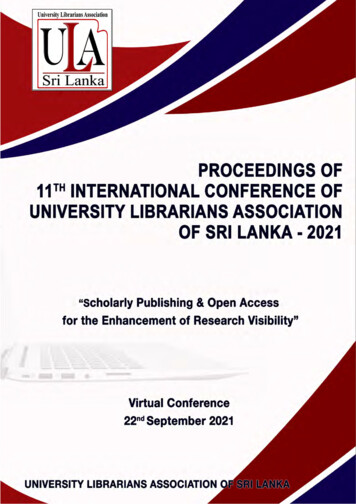
Transcription
International Conference of University Librarians Association of Sri Lanka (ICULA) - 2021
PROCEEDINGS11th International Conference ofUniversity Librarians AssociationofSri Lanka -2021"Scholarly Publishing & Open Access for theEnhancement of Research Visibility"22nd September 2021(Virtual Conference)University Librarians Association of Sri LankaInternational Conference of University Librarians Association of Sri Lanka (ICULA) - 2021
2021 - University Librarians Association of Sri LankaProceedings of the 11th International Conference ofUniversity Librarians Association (ICULA) - 2021E-ISBN: 978-624-5981-00-7Published by the University Librarians Association of SriLankaViews expressed in this conference volume do not necessarily reflect the views of the UniversityLibrarians Association of Sri Lanka. Neither the University Librarians Association of Sri Lankanor the Editorial Committee is responsible for any material produced in this publication.International Conference of University Librarians Association of Sri Lanka (ICULA) - 2021
Conference CommitteeConference ChairDr. Chammika MallawaarachchiLibrarian (Acting)General Sir John Kotelawala Defence UniversityConference SecretaryDr. M.M. MashroofaSenior Assistant LibrarianSouth Eastern University of Sri LankaConference Co-SecretariesMrs. M.P. RajapakshaSenior Assistant LibrarianGeneral Sir John Kotelawala Defence UniversityMr. V. AlagaratnamSenior Assistant LibrarianGeneral Sir John Kotelawala Defence UniversityCo-Chair - PublicationMrs. K. H. Thushara AbeysekeraSenior Assistant LibrarianThe Open University of Sri LankaCo-Chair - SponsorshipsDr. S.K. IllangarathneSenior Assistant LibrarianRajarata University of Sri LankaCo-Chair - Web & TechnicalMr. A.D.B. KumaraSenior Assistant LibrarianUniversity of MoratuwaCo-Chair - FinancialDr. R.D. Ananda TissaSenior Assistant LibrarianGampaha Wickramarachchi University of IndigenousMedicineWeb & Technical CommitteeVen. Deiyandara Pannananda TheroAssistant LibrarianUniversity of KelaniyaMr. Saman GirakaduwaSenior Assistant LibrarianUniversity of the Visual and Performing ArtsMr. B.E.S. BandaraAssistant LibrarianSouth Eastern University of Sri LankaInternational Conference of University Librarians Association of Sri Lanka (ICULA) - 2021i
Editorial CommitteeEditor-in-ChiefMrs. K. H. Thushara Abeysekera, Senior Assistant Librarian, The Open University of Sri LankaEditorial BoardMrs. Ramani Amarasekera, Deputy Librarian, The Open University of Sri LankaDr. W.R.W.M.A.U. Weerakoon, Senior Assistant Librarian, The Open University of Sri LankaMrs. P.G.R. Samarawickrama, Senior Assistant Librarian, University of Sri JayewardenepuraDr. Manjula Wijewickrema, Senior Assistant Librarian, Sabaragamuwa University of Sri LankaMrs. Chithra Abeygunasekara, Senior Assistant Librarian, University of KelaniyaDr. S.K. Illangarathne, Senior Assistant Librarian, Rajarata University of Sri LankaMrs. Kanchana Jayasekara, Senior Assistant Librarian, University of RuhunaInternational Conference of University Librarians Association of Sri Lanka (ICULA) - 2021ii
Panel of ReviewersDr. Anoma Weerakoon, Senior Assistant Librarian, The Open University of Sri LankaDr. G.D.M.N. Samaradiwakara, Senior Assistant Librarian, University of Sri JayawardanapuraMr Harsha Balasooriya, Acting Librarian, Open University of Sri LankaMrs. P.G.R. Samarawickrama, Senior Assistant Librarian, University of Sri JayawardanapuraMrs. Kanchana Jayasekara, Senior Assistant Librarian, University of RuhunaDr. Manjula Wijewickrema, Senior Assistant Librarian, Sabaragamuwa University of Sri LankaDr. Ruwan Abeysekera, Senior Lecturer, University of KelaniyaDr. R.D. Ananda Tissa, Senior Assistant Librarian, Gampaha Wickramarachchi University ofIndigenous MedicineDr. S.K. Illangarathne, Senior Assistant Librarian, Rajarata University of Sri LankaDr. Achala Ranaweera, Senior Assistant Librarian, University of KelaniyaMr. S. Santharooban, Senior Assistant Librarian, Eastern University of Sri LankaMrs Sajeewani Somarathna, Senior Assistant Librarian, University of ColomboDr Kokila Ramanayake, Senior Lecturer, University of KelaniyaMrs Komathy Murugathasan, Senior Assistant Librarian, University ColomboMr I. D. K. L. Fernando, Senior Assistant Librarian, Sabaragamuwa University of Sri LankaDr T. Pratheepan, Senior Assistant Librarian, Uva Wellassa University of Sri LankaMrs Harshani Dissanayake, Senior Assistant Librarian, University of PeradeniyaMr M. N. Ravikumar, Senior Assistant Librarian, Eastern University of Sri LankaInternational Conference of University Librarians Association of Sri Lanka (ICULA) - 2021iii
SPEECH OF THE CHIEF GUESTMAJOR GENERAL MP PEIRISRWP RSP VSV USP ndc pscVice ChancellorGeneral Sir John Kotelawala Defence UniversityReverend Sirs,The President, University Librarians Association of Sri Lanka and the Conference Chair,International Conference of University Librarians Association - ICULA 2021, Dr. ChammikaMallawaarachchi, Acting Librarian of the General Sir John Kotelawala Defence University,Keynote Speakers,Mrs. Barbara Lison, President of International Federation of Library Associations andInstitutions (IFLA),Mr. Jeevan Thiaagarajah, Executive Director, Centre for Humanitarian Affairs, Sri Lanka,Dr. Mrs. Pradeepa Wijetunge, Director, National Institute for Library & Information Science,University of Colombo,Executives and Representatives of the University Librarians Association of Sri Lanka,Librarians, acting Librarians, and members,Invitees, Distinguished participants, Ladies and Gentlemen,Good Morning to all of you!Let me begin by thanking the University Librarians’ Association, especially the President Dr.Chammika Mallawaarachchi and the Executive Committee of the Association for inviting me asthe Chief Guest at the International Conference of the University Librarians’ Association 2021organized on the important theme, “Scholarly Publishing & Open Access for the Enhancementof Research Visibility.” – a theme I believe is pertinent in many respects.KDU has been actively supporting the activities of the University Librarians’ Association since2015 when, as the then Vice Chancellor, I got our library staff KDU to get the membership inyour Association. And since then, KDU librarians and assistant librarians have been very activemembers of your Association. I am glad that our present librarian is currently giving theleadership to your Association. And I am happy to speak a few words at this importantacademic event of yours as we believe that your progression has a direct bearing on theprogression of our libraries and of our universities in turn.International Conference of University Librarians Association of Sri Lanka (ICULA) - 2021iv
Recalling my memories of our school days, generally the impression we had of a library and alibrarian, I would say, is not a very positive one. The library was treated as a place of sanctitythat children feared to step in. The ghostly silence, the grandiose and closely monitored bookracks, the musty smell of old untouched books, and more than everything, the imposing figureof a person called the librarian with an eagle’s eyes and a hound’s ears – a person who assumedcontrol, authority and ‘ownership’ over the books as well as of those who worked in the library,and even of the innocent readers who entered there. We, the students, feared the threateninglibrary and preferred the freedom and enjoyment at the playground, which attracted us evenduring the so called library periods. This is perhaps the story of you, the university librarianstoday, during your school time. However, I am sure that the university libraries that youmanage today are just the contrast. I am sure they operate as the hearts of your universities orhigher education institutions that attract students and staff and help them in scholarly work ofaccumulation, generation and dissemination of knowledge.Ladies and gentlemen, the history of libraries is reported to run back to more than 5000 years,and as per the available records, it was in South Western Asia or in Mesopotamia that the firstknown libraries had been established, where inscriptions on clay tablets were displayed forreading. Since then human civilizations have evolved with knowledge being passed down fromgeneration to generation, with libraries of the time contributing to the knowledgedissemination process. Ola leaf inscriptions that predominated in Asia, hand-scribed writingson parchments made of animal skins, and later on parchments made of paper produced duringEgyptian, Greek and Roman civilizations are notable aspects in the evolutionary process. It waswith William Caxton’s introduction of the first printing press in 1476 and the publication of theGutenberg Bible that hand-scribed books began to be replaced by modern printed books, whichenabled the facility for having large number of copies of the same book to be placed on libraryracks throughout the world.We, in the 21st century today, are rapidly moving into the digital world and have moved intothe new paradigm of digital libraries where we can share knowledge through digital means ore-books, e-journals etc. without having to physically visit the libraries that maintain physicalrepositories arranged in book racks with physical catalogues to facilitate the readers. Instead,e-library facilities are increasingly being used to enhance efficiency in academic and scholarlywork. Now the e-library concept has assumed a greater significance in the new normalsituation, and even those of us who were rather reluctant to change are now compelled to seekthe assistance of e-resources. So, in a way the pandemic has become a blessing in disguise forour progression for the future.Universities as you know are the places that generate and disseminate new knowledge, and auniversity library is identified as its heart because it constantly supplies the energy to sustainthe mechanism of knowledge accumulation, production and dissemination. Without a soundlibrary system, the body of a university would be similar to that of an ailing, unhealthy personwhose heart is extremely weak. So, you as university librarians have a huge responsibility toInternational Conference of University Librarians Association of Sri Lanka (ICULA) - 2021v
provide the best facilities for your clientele,that is the students and academics of youruniversity. It is only then they could function fully in their scholarly activities. You have the dualrole of being administrators as well as academics. The constant updating of knowledge andengagement in research in your field is essential to keep your libraries up to date. It is also yourresponsibility to keep university administrators, academics and students updated andeducated on aspects that need enhancement, and in that sense, I believe that an active librariancan be the true agent of change in a university.Ladies and gentlemen, as much as the library is the heart of a university, I believe that theuniversity is the heart of a nation, and a nation with a weak tertiary education system will neverachieve its desired developmental goals. In other words, the future of a nation largely dependson how best its university system produces intellectuals, intellectually potent professionals andleaders for the nation. It is generally believed that the independence of a nation would dependlargely on its economic strength and sustainability, but in an era in which we talk of aknowledge economy, the success of a nation will depend largely on knowledge generationthrough research. So the amount of meaningful and productive research conducted andfacilitated by university scholars in diverse fields, perhaps in collaboration with professionalsin the industry, will collectively support the development and elevation of a nation altogether.Ladies and gentlemen, I believe that the university ranking is an index that indicates where westand in terms of generation of new knowledge. We in Sri Lanka should seriously address thisissue and realistically look at our status in the world university ranking and what our problemsare. As a Vice Chancellor of a university that aspires to constantly introduce meaningful andprogressive changes in the university to enhance its recognition in the global university rankingthrough facilitation for research, I find that the theme of your conference is very significant.And if and when we reach internationally acceptable levels of recognition, Sri LankanUniversities would be able to attract foreign students thus enabling the country to earn foreignexchange through education. A cynic may argue how could we do that when we cannot evenaccommodate local students in our universities, but I believe that given the proper leadershipand proper orientation, Sri Lanka can achieve such targets in the future. What we need ispositive thinking intellectuals to take the lead.The choice of the theme, “scholarly publishing and open access for enhancement of researchvisibility”, indicates your willingness to take leadership in positive directions and yourawareness of the importance of not only research and scholarly publications but also of thevisibility of research. I think your deliberations under this theme would themselves end up inscholarly publications and practical solutions to resolve stumbling blocks in our systems.We need to understand that emphasis in our universities for quality research is comparativelyless, of course due to diverse reasons. And even the limited research findings available getlimited to unpublished theses and dissertations carefully maintained in library racks inuniversities, and thus comes the question of their visibility. So not only should we facilitate forscholarly work of high standing, but we also need to facilitate for the visibility of such researchInternational Conference of University Librarians Association of Sri Lanka (ICULA) - 2021vi
so that other researchers would read them and cite them in their own research thus increasingthe citations of a researcher, which in turn encourages further research through recognition inhis or her discipline. That is where our scholars can earn a name in their specific disciplinarydomains assuming prominence in the business of knowledge generation.We know that many of our scientists, academics and scholars leave for greener pastures inpowerful countries especially in the west, and some of them have earned name and fame andintroduced many new innovations to the world. But the question is why they cannot do thesame being in the country. One main problematic area is the unavailability of access to goodjournals and data bases that contain latest research findings in the world. I believe that theuniversity libraries need to be proactive in finding possibilities and resources available andcreating awareness among academics and students, which will definitely encourage them toconduct meaningful research and propagate such knowledge through indexed and peerreviewed journals of high acceptability.Open Access (OA) has been defined as “a means of disseminating scholarly and scientificliterature over the internet free of charge to researchers and to anyone else who might benefitfrom accessing the results of publicly funded research". However, I believe that you, thelibrarians need to find out how open they are – the degree to which a so called open accessjournal is actually open for readers need to be found out. We need to realize that scholarlypublication is also a part of international business. And it is the responsibility of librarians toresearch into this aspect too so that they can make their clientele educated on getting the bestuse from open access publications. We at KDU give the highest priority for providing thenecessary infrastructure both physical and digital, provided we are convinced that suchinvestment would be worthwhile for the progression of our university through positiveoutcomes.So let me conclude my expression of thoughts wishing you all the best in your deliberations thatwill enhance your horizons in the discipline of library science so that you could contribute moretowards your respective universities to engage in the role and task of not only producinggraduates but more importantly of enhancing scholarly work that will elevate our universitiesto a higher level in the world university ranking. Let us hope that librarians, academics,administrators and students of universities in Sri Lanka look at the modern problems in highereducation in a more holistic and rational way to move with the rapidly changing world so thatwe all could contribute to the betterment of our nation and that of the humanity at large.I thank you.MAJOR GENERAL MP PEIRISVice ChancellorGeneral Sir John Kotelawala Defence UniversityInternational Conference of University Librarians Association of Sri Lanka (ICULA) - 2021vii
MESSAGE FROM THE CONFERENCE CHAIRDR. C MALLAWAARACHCHIConference Chair & President, ULAActing LibrarianGeneral Sir John Kotelawala Defence UniversityIt is a great pleasure to welcome you all to the International Conference of UniversityLibrarians Association– ICULA 2021.This is a truly unique platform for us to come together and shape the future in scholarlyresearch, publications and to enhance their visibility.First and foremost, let me very warmly welcome our chief guest, Major General Milinda Peries,Vice Chancellor of the General Sir John Kotelawala Defence University for very kindly acceptingour invitation and for gracing this occasion as the chief guest of ICULA - 2021.I consider your presence, as one of the most legendary Officers in Defence, the Vice Chancellorand a scholar, as a great honour to the University Librarians Association of Sri Lanka.I warmly welcome our keynote speaker, Mrs. Barbara Lison, President of the InternationalFederation of Library Associations and Institutions. It is a prodigious integrity to ULASL, youare delivering a keynote speech at ICULA-2021.Also, I welcome Mr. Jeevan Thaigaraja, Executive Director, Center for Humanitarian Affairs, SriLanka. It is a great pleasure to ULA, your presence as a keynote speaker here today to color theICULA-2021.Then I welcome Dr. Mrs. Pradeepa Wijetunga, the Director, National Institute of Library andInformation Science, who is having a very close affinity with ULA as an illustrious member ofour Professional association.This year’s theme of ICULA ‘Scholarly Publishing & Open Access for the Enhancement ofResearch Visibility' highlights the importance of scholarly works where all of us engaging inand their visibility and access for enhancement of knowledge. In the last few years, we haveheard the terms: fake news, disinformation, misinformation, repeatedly. Yet, we do not knowhow to be better informed, fight this phenomenon or train people in combating it. With a vastmajority of the population relatively new to technology, and not trained in any formal way todecipher the real from unreal, truth from half-truths and lies, people end up believingdisinformation as truth, especially when there is enough repetition.ICULA 2021 may bring new insights to this phenomenon and its implications, the currentefforts and their degrees of success, and provide directions for information professionals onthe importance of scholarly publishing and research visibility to fight against disinformationand simulated knowledge.International Conference of University Librarians Association of Sri Lanka (ICULA) - 2021viii
ICULA 2021 is taking place here in Colombo, Sri Lanka amidst very challenging circumstances,however, it becomes a significant event of the University Librarians Association of Sri Lanka interms of its resolution to ensure the continuity of ICULA even under the most tryingcircumstances.ICULA has been attracting local and foreign presenters, participants and distinguished scholarsand professionals in the field of Library and Information Science both locally andinternationally since 2005. However, this year, the COVID 19 pandemic situation has restrictedhaving them physically present here in Colombo, Sri Lanka. But many of our invitees join us ona virtual platform.I am very enthusiastic and it will be great to hear from our keynote speakers about theinfluence, priorities, development and comparison to international trends in scholarlypublishing and research visibility. Also, from paper presenters’ novel and innovativeknowledge, practices and experiences in the same field were very significant now. At last butnot least I warmly welcome all the paper presenters, ULA members, local as well asinternational participants for the conference. You are a very valuable asset for the ICULA/2021,without you not the event is success.May I conclude, ICULA 2021 has been recognized as an academic event nationally andinternationally to establish and strengthen research culture.I wish you all a happy and successful conference.Thank you.Dr. Chammika MallawaarachchiConference Chair, ICULA 2021International Conference of University Librarians Association of Sri Lanka (ICULA) - 2021ix
MESSAGE FROM THE CONFERENCE SECRETARYDR. MM MASHROOFASenior Assistant LibrarianSouth Eastern University of Sri LankaI take great pleasure in extending these greetings in my capacity as Secretary of theInternational Conference of University Librarians Association (ICULA) to all the guests andparticipants of this event. The virtual conference that is organized by the University LibrariansAssociation of Sri Lanka (ULA) will be held on 22 September 2021. I appreciate the effort putin by the ICULA 2021 committee to hold this conference amidst many challenges posed by thefourth wave of the COVID-19 pandemic. I congratulate the Conference Chair, Co-chairs, Cosecretaries and technical committee members of ICULA 2021 for all the trouble they have takento conduct this program successfully.The theme of ICULA 2021 addresses a very pertinent and timely topic, which is “ScholarlyPublishing and Open Access to Enhance Research Visibility.” The keywords scholarlypublishing, open access and research visibility are the prominent and crucial aspects ofknowledge dissemination that must be considered by academic librarians and other librarypractitioners. This is particularly relevant now as the pandemic and the ensuing lockdowns areforcing us to develop these three aspects in order to provide library support services to remoteusers, to enable them to access scholarly information for teaching, learning, and researchpurposes from vast repositories of knowledge.The Chief Guest, Major General MP Peiris RWP RSP VSV USP, Vice Chancellor of General Sir JohnKotelawala Defence University will grace the occasion and address the gathering. The keynotespeakers, Ms. Barbara Lison, President, International Federation of Library Associations &Institutions (IFLA), Mr. Jeevan Thiagarajah, Chairman, Centre for Humanitarian Affairs, and Dr.(Mrs) Pradeepa Wijetunge, Director, National Institute of Library and Information Sciences,University of Colombo, Sri Lanka will deliver the keynote addresses. Thirteen research papersby local and international researchers will be presented. Following the technical session, aplenary session will be held with three eminent scholars in the field of Library & InformationScience.I express my heartfelt gratitude to the Chief Guest, keynote speakers, paper presenters, plenaryspeakers, conference committee members and the executive committee members of ULA forthe valuable contributions they have made to make this event a great success.I take this opportunity to wish all the paper presenters and participants a rewarding andpleasant experience.Thank you.Dr. M.M. MashroofaSecretary, ICULA 2021International Conference of University Librarians Association of Sri Lanka (ICULA) - 2021x
KEYNOTE SPEECH (ABSTRACT)MRS. BARBARA LISONPresidentInternational Federation of Library Associations & Institutions (IFLA)IFLA, International Federation of Library Associations and Institutions, is the global voice forlibraries! The federation supports the professional development of libraries worldwide and isalso an actor for advocacy for libraries in the international field. Especially in the last five years,IFLA has developed a higher impact for the political acknowledgment of the libraries and theirservices towards research and academia as well as for the library services to the general public.In her speech, IFLA President Barbara Lison will report about the latest developments to thebenefits of the libraries and the librarians to serve their clients and users.International Conference of University Librarians Association of Sri Lanka (ICULA) - 2021xi
KEYNOTE SPEECHMR. JEEVAN THIAGARAJAHChairmanCenter for Humanitarian Affairs (Gte) Limited No. 15/5, Victoria Place,Colombo 08, Sri LankaOpen Access (OA) enables individuals to freely access the complete text of an academic journalwithout the need for a subscription, payment, or registration. This essentially means thatanyone with Internet access, regardless of whether you’re in academia or not, is just one mouseclick away from obtaining a reference or scouring through the academic literature.When discussing OA, predatory journals have often taken centre-stage which diverts focusaway from the beneficial aspects of OA not just to those in academia but to the broader publicas well.Let’s take a look at the impact on academics first. Open access publishing grants authors withmore visibility as more people can read their work and download the articles as PDFs. Usually,researchers can easily access articles relating to their field of work through their libraries yetit’s harder for them to find literature relating to other areas unless they obtain tedious interlibrary loans. Universal open access will enable researchers to transcend this barrier and savetime when finding articles; this is especially useful because they have to scour throughhundreds or even thousands of references every year so every second counts. This could beespecially important in Sri Lanka as there is a funding discrepancy when compared to the Westwhere researchers have access to well-funded libraries. Our researchers can gain access to awealth of information and promote their work if they support open access publishing.Importantly then, researchers could gain access to ground-breaking findings from otherdisciplines which could promote collaboration between fields and heighten the mutualappreciation between academics.Academics make up a small portion of the population yet Open Access publishing can haveimpacts on the laymen too. Granting more open access options to the public will allow them togain valuable information particularly with regard to health that they could use in conjunctionwith professional advice to complement their treatment programs. This will provide the publicwith more agency and could incentivize them to take a more proactive role in theirhealing/educational process. More importantly, in this COVID era, access to reputed scientificjournals could combat the insidious impacts of fake news that is prevalent on so many socialmedia platforms. Public with access to reputable journals will be able to correct mistakes andprotect themselves from falling prey to incorrect and outdated information.International Conference of University Librarians Association of Sri Lanka (ICULA) - 2021xii
However, one cannot forget about the pitfalls of OA when discussing this topic. Firstly, thepredatory journal publishers do lurk on the internet, offering researchers false promises suchas the unregulated access to competent peer review processes and a place on supposedlyreputable platforms. In the same vein, the public might find it difficult to disseminate betweencredible sources and unreliable articles in predatory journals which may have been marketedwell. This could result in the public coming to false conclusions and using social media to spreadthat incorrect information. It is a double-edged sword.With regard to the economic component of OA in the Sri Lankan context, publishing processfees acts as a deterrent as the lack of funding in research domains is quite evident. Thiscontributes to the Western bias in journal content as Westerners have funds to privatelypublish articles in an Open-Access format.That being said, there are several measures that can be taken to combat predatory publishingand promote the sustainable use of Open Access publishing. . There is no better way to facilitatechange than to include those who are most passionate about it. Given that there are multiplestakeholders, the logical route would be to organize collaborative efforts between them topromote open-access publishing. In particular, there should be cooperation between researchfunders, universities, major publishers, and local libraries. This collaboration should ideallylead to the establishment of a regulatory body that oversees the sustainable, reputablepublishing of open-access articles and cracks down on any and all predatory journals withinthe country. Additionally, a “whitelist” of accepted journals could be drawn up to helpresearchers disseminate between quality journals and unreliable ones. At the same time,funders should pledge to only support high-quality journals that are committed to ethicalresearch processes. In the same vein, despite the allure of gaining research exposure, those inacademia should reject offers to publish in fraudulent journals and refuse to accept offers ofboard membership and gift editorship.Universities can create mandates asserting that faculty members must make OA versions oftheir articles. Again, as funding seems to be the big issue with regard to OA publishing,universities could seek to work with other research institutions to create proposals for externalfunding. This is easier said than done but collaborative efforts will have a much higher chanceof success than individual efforts to promote OA publishing.With regard to the public recipients of
The Open University of Sri Lanka Co-Chair - Sponsorships Dr. S.K. Illangarathne Senior Assistant Librarian Rajarata University of Sri Lanka Co-Chair - Web & Technical Mr. A.D.B. Kumara Senior Assistant Librarian University of Moratuwa Co-Chair - Financial Dr. R.D. Ananda Tissa
